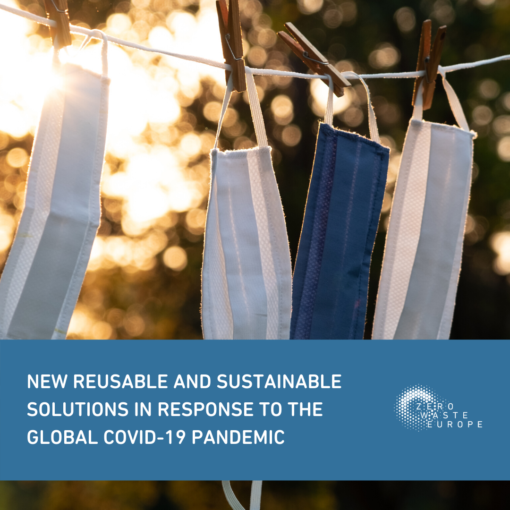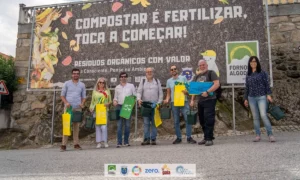
New reusable and sustainable solutions in response to the global COVID-19 pandemic
At Zero Waste Europe our highest priority is to keep ourselves and our communities safe and healthy. It is critical that we stand in solidarity with all the communities affected by COVID-19 and we understand that companies are trying to keep their customers and workers safe, which should be their primary concern. Nevertheless, plastic pollution remains a significant environmental issue and we should keep working with businesses to address it. This is why reusable initiatives are so important.
COVID-19 has brought an immense amount of confusion and difficulty to zero waste and reusable systems. In some countries, it has meant the suspension of separate collection systems, a mistrust in reusable products, and informal recycling economies collapsing in the global south leaving many unable to recycle (read more about COVID-19 and zero waste). Despite this, there have been some successful examples across Europe and beyond, of reusable solutions to help deal with the global struggle. The positive impacts of communities working together is sure to have a long-lasting impact. Throughout this blog, we highlight reusable initiatives that are helping people face this crisis in an innovative and sustainable way.
Spain was hit dramatically by the virus and has so far been subject to over 240,000 cases. Despite this, there have been multiple new initiatives, such as the ‘Spain’ project: led by Bioquochem in partnership with the Ministry of Science, involving companies such as Therman and Olmar, who created an industrial model that allows them to sterilise and recycle 500,000 masks a day to be delivered to health care services.
There has also been significant progress towards the building of licensed respirators with reused materials known as ‘OxyGEN’ which has recently been endorsed by the Spanish Government. Helping to build this prototype were the sustainable Spanish companies eReuse and USOdy, and in a recent post, OxyGEN was described to have passed multiple tests and will soon be used in hospitals across Spain.
The textile company Textil Ortiz manufactured 100% sustainable and reusable gowns for doctors. However, despite producing 20,000 a day and aiming to reach 50,000 in the near future, there have been continued issues with procurement of materials due to economic shutdown. The Ministry of Health too, are overwhelmed, meaning the provisional authorisation needed from the Government has been delayed, halting the possibility of large amounts of distribution across Spain.
In Italy, Zero Waste Italy started a project alongside Dismeco SRL to recover and reuse spare parts of discarded electromedical devices to address the shortage of equipment. This is important as there are large amounts of dated equipment, or many that cannot be used as they lack the necessary spare parts.
Reusable masks have become essential as many hospitals suffer from the unavailability of appropriate protection equipment. The Italian company EtaBeta which has already developed a system of reusable diapers (LAVANDA) are developing a similar concept for masks to rent them daily to hospitals and companies.
In Portugal, the Ministry of Health has asked many public organisations such as INFARMED (medicines approval), ASAE (Enforcement Agency on Food and Economy Safety) and CITEVE (Research Centre for Textiles Industry) to produce reusable masks. Due to the success of this, the Ministry has outlined that in post-COVID-19 recovery, there will be significant work involving universities and research bodies in incorporating more reusable materials into the health care sector as a whole.
N95 respiratory masks worn by healthcare workers are in dangerously short supply. However, Duke University has developed a method of cleaning them using vaporized hydrogen peroxide to kill microbial contaminants that remain in masks after use, so they can be re-worn, this solution reduces waste and prevents the risk of infection.
These new mask-related initiatives are a success for sustainable initiatives and demonstrate that even after a pandemic, zero waste is possible with large amounts of support in communities, businesses and governments.
With schools closing across the world, there has been a huge shift to online classes. This presents issues for children who do not have access to laptops or internet and it could have long-term negative impacts if they are unable to complete their education. In Greece, the Oraiokastro WEEE classification and reuse centre donated 17 laptops and tablets to our member ECOREC (Ecological Recycling Committee) to be distributed to local children with no IT equipment – helping to tackle internet poverty through zero waste solutions.
However, during this crisis there has been some significant opposition to the concept of reusable products as in the US, the governor of Massachusetts banned reusable bags and lifted plastic bag bans. In New York, the state delayed its plastic bag ban until the end of June 2020. There has therefore been great confusion over the contamination risk of reusable bags and, especially in the UK, there has been a notable shift back towards plastic disposables in the food industry, and the promotion of single-use products to prevent the spread of the disease.
Even if some may question the safety reusables, they have been proven to be just as safe as single-use plastic and other kinds of packaging. They can both still carry the virus as any touching of packaging has the ability to pass the virus onto other surfaces (Read Zero Waste Europe & Reloop’s policy paper on reusable packaging & COVID-19 ).
There is still a substantial amount of work to be done in the aftermath of this global crisis to ensure governments and companies continue to work towards sustainable, zero waste initiatives. This pandemic has brought many positive ideas and projects that should be celebrated. Not only has the global community worked together to create reusable products to protect the most vulnerable, but it has also served as a key lesson for the future. Despite the challenges that COVID-19 has brought, we are hopeful that it has shown the importance of resilience and the power of the human mind when it comes to protecting the environment and the people that rely on it.


